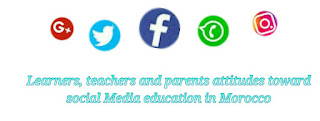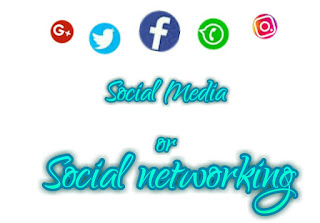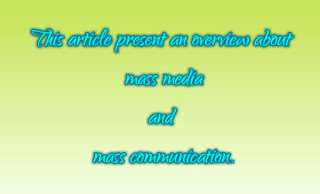Learners, teachers and parents attitudes toward social Media education in Morocco
Before discussing the significant aspect of teachers and parents attitudes toward social Media in education in Morocco, it is necessary to give a brief meaning of attitude, although we have already covered this concept.
Attitudes are defined as an opinions and ideas of people they possess towards particular objects. According to M.Fishbein, "Attitude is defined as an implicit producing response considered socially significant in the individual's society.” Also H.H.Remmer, Gage N.L and Rummel J. Francis have explained attitude "as an emotionalised tendency, organised through experience, to react positively or negatively towards a Psychological object.”
However, in the next part, the discussion will revolve around the attitudes of teachers and parents toward social Media education in Morocco.
1- Learners attitudes toward social Media in education in Morocco
Education is very important for students and social media is becoming an educational tool these days. Students are engaged in social media sites to help them stay in contact with peers and educators. E- Learning is the use of electronic technologies that allow learners to access to educational curriculum outside the classroom. It involves a course, program or degree of students. It provides students with an opportunity to share information, collaborate, and discuss experiences in the learning process. However, few studies have been talking about this; for instance, Ming-Chi declared that “e-learning users face several new constraints, such as the impersonal nature of the online environment. Also O’Hear indicated that; “Traditional approach to e-learning tends to be structured around courses, timetables, and testing an approach that is too often driven by the needs of the institution rather than the individual learner.” (O’Hear, S. 2011)
In contrast to other researchers, Ebner claimed that “in current e-learning, lecturers deliver the content, students learn it, and there was no memorable change, less collaboration, less learner participation, and grading.” (Ebner, M. 2007)
However, social media in Morocco have opened new doors for average people to connect and express their feeling and opinion. Today, almost all Moroccan learners can write, create videos and share information on one of the social media sites such as facebook, YouTube and blogs. Rachid Jankari, a Journalist - Directeur associé Agence digitale Storm Like, shared some thoughts about the use of social media in our country, believing that it is different from other countries because we have high number of users especially students, around 16 million Internet users in a country with a population of 30 million people, four million facebook users and 400,000 3G subscribers. The international Media Support, also, found that a great number of Moroccan learners tend to use social media such as blogging and particularly facebook which become the common social platform building up more and more users.
This is the technological and development age that the use of online platforms can affect students whether positively or negatively. In some cases, if a person resorts to use social media websites that explain and elaborate lessons in an easy way, such as YouTube and Google for the purpose of science and education, then they are considered positive sites. But if it was used for entertainment such as video games, it will affect users and may become addicted to online sites.
Some learners have such positive attitudes towards the use of social media in education in that, they use social media for the purpose of strengthening their knowledge and ability to learn as well as enrich the cumulative knowledge. To that end, social media platforms have a significant role in exchanging opinions and knowledge and can help students to receive information promptly.
2- Teachers and parents attitudes toward social Media education in Morocco
This is the main section the study is attempting to investigate, which it focuses on the attitudes of parents and teachers that have on social media in education. In the present time, the new social media platforms play an important role in terms of education especially for students. In that it gives people an ability to connect, collaborate and share information. On a short paper by Rdouan Faizi, Abdellatif El Afia and Raddouane Chiheb in Rabat, Morocco about “social media: An Optimal Virtual Environment for Learning Foreign” Taking all these educational benefits into consideration, social media can serve as an ideal environment for learning foreign languages.”
Furthermore, a great number in parents and teachers have believed in the idea that using social media sites in education can be useful if it is used appropriately. Social platforms are considered an opportunity to steer between teachers and learners and ask questions concerning the learning activities. Most parents and teachers indicated that the educational institutions should put a systematical plan for an effective and positive use of social media networks. In addition, the use of social media sites in education can help students to collaborate more and improve participation (for instance, the use of facebook or whatSapp groups), and improve technological ability.
An article wrote by Nora Fleming, Education Week about “Schools are using social networking to involve parents” indicating that "Digital learning levels the playing field among parents in a pretty profound way," said Elisabeth Stock, the chief executive officer and co-founder of CFY, or Computers for Youth, “a New York City-based nonprofit that works with low-income communities and schools to improve digital literacy”. She included that parents are better to be familiar with the social media platforms their children use for learning or entrainment after completing school days. For some parents they believed that grades of students become better and absence is decreased. So with the use of social media network (YouTube for example), students can reach the source of information and communicate to facilitate online learning.
Almost students tend to use social learning sites where they can get the answers for all their questions without attempting to ask teachers in class. In fact, there are such designed websites which offer online lessons, exercises and text as well as tests, audio and video chat in many languages, and where students can learn and practice new language with native speakers.



Comments
Post a Comment